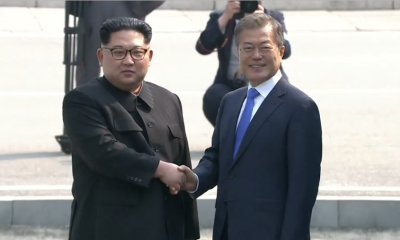A Korea Vision

President Donald Trump tried to elevate Kim Jong-un's vision for a new North Korea by showing the dictator a Hollywood-embellished short film depicting what North Korea could become if Kim would abandon his tyrannical, missile-happy ways.
"The future remains to be written," said a quick-flashing teaser line in Korean and English.
Actually, that "future" might be best achieved by a recovery of the past.
At the beginning of the twentieth century, Pyongyang, Kim's hometown, was known as "the Jerusalem of the east." Church spires towered over the city. A vibrant Christian revival pulsated through the land.
To comprehend what North Korea's future could look like, all Kim needs do is contemplate South Korea. Theologian and Korea expert Kirsteen Kim says that "the economic boom of the country could never be explained completely apart from the religious influence coming from Christianity."
Dr. Kim said in a paper written for Trinity University College (UK) that South Korea's "growth to become the world's eleventh largest economy has been accompanied by the introduction of Christianity and its increase to become the major religious group, to which nearly thirty percent of the population are affiliated."
The result is that "there is shown to be a constructive, although not always intentional, link between Korean Christianity and national development," writes Dr. Kim. Specific impacts of Christianity have included a strong work ethic, aspirations and hope for a new society, and empowerment of the people to bring it about.
"In other words," she says, "it was the public theology of Christianity that played a highly significant role in the modernization and revitalization of Korean society in the twentieth century."
Christianity, both Protestant and Catholic, has encouraged a "holistic approach" in which visions for a better life are not limited to one's eternal salvation, but to society, family, education, work, and governance.
The New Testament theology of the Kingdom of God has stimulated a "developmental approach," says Dr. Kim. One outcome is that "among the top five universities in the country three of them could be traced to the Christian tradition."
South Korea has become the home of some of the world's largest churches, including perhaps the world's biggest—Yoido Full Gospel Church, with some 800,000 members.
At the same time the nation has such a vibrant church life—and, ironically, some would say, because of it—South Korea also has a reputation for strong political disagreement and protest. The roots of such expression, sometimes pouring into the streets of Seoul and other South Korean cities, lie at least partly in the church. Christian leaders and their churches, notes Dr. Kim, have played roles in nationalist and independent movements in the country.
Japanese occupation spurred Korea's Christians to employ prayer and revival meetings to resist "Japanese cultural imposition." Christians paid a hefty price for such resistance, but the result was the strengthening of the will to take a stand.
"Democracy is the worst form of government except for all the others," said Winston Churchill, quoting one of his predecessors in Parliament. Robert Kennedy reputedly remarked that democracy is "messy." That has sometimes proven the case in South Korea, but it beats the terror and suppression of free speech that exists in North Korea. South Korea's healthy culture of protest is a positive mark of its political culture.
Christianity does not work when the aim is the establishment of a theocracy. Under that goal it is no longer the vibrant faith that has helped form South Korea's dynamic culture and society. Rather, theocratic Christianity—and any other religion—is just one more authoritarian institution among the scads that have crushed liberty throughout history.
Biblical Christianity does not eschew the mind, but is very much the way of the heart. As South Korea shows, it is a living dynamic, based on relationship between people and God and people and their neighbors.
I saw the heart of Korea on a visit there many years ago. I was with my friend and mentor, John Edmund Haggai. He had told me to meet him in the hotel dining room for breakfast with some of our South Korean hosts. Jet-lagged from the Pacific-spanning flight, I awoke at 3:30 a.m. After an hour of tossing and turning, I turned on the television set. A dignified older man was on the screen. I could not understand what he was saying, but could sense it was important.
About three hours later when I went down for breakfast, the man I had seen on television was sitting with John Haggai, conversing. He was Dr. Kyung Chik-Han, pastor of Seoul's Young Nak Presbyterian Church, the world's largest Presbyterian congregation. He explained that he was on television because every morning the national broadcasting service had someone on air to begin the day with prayer.
After breakfast, Dr. Chik-Han took us to the church. He told us how it had been organized in 1945, primarily reaching refugees from Soviet-occupied North Korea. Though Dr. Chik-Han had been awarded the Templeton prize, a million dollars for his humanitarian work, he gave away the money, and spent his last years in a church-owned cabin.
For many, the face of the Korean people is Kim Jong-un. But to my mind, Kyung Chik-Han is the true countenance of that nation. To ignore people like him, and the faith for which they lived and died, is to miss the true story of South Korea—and hope for the North.




















